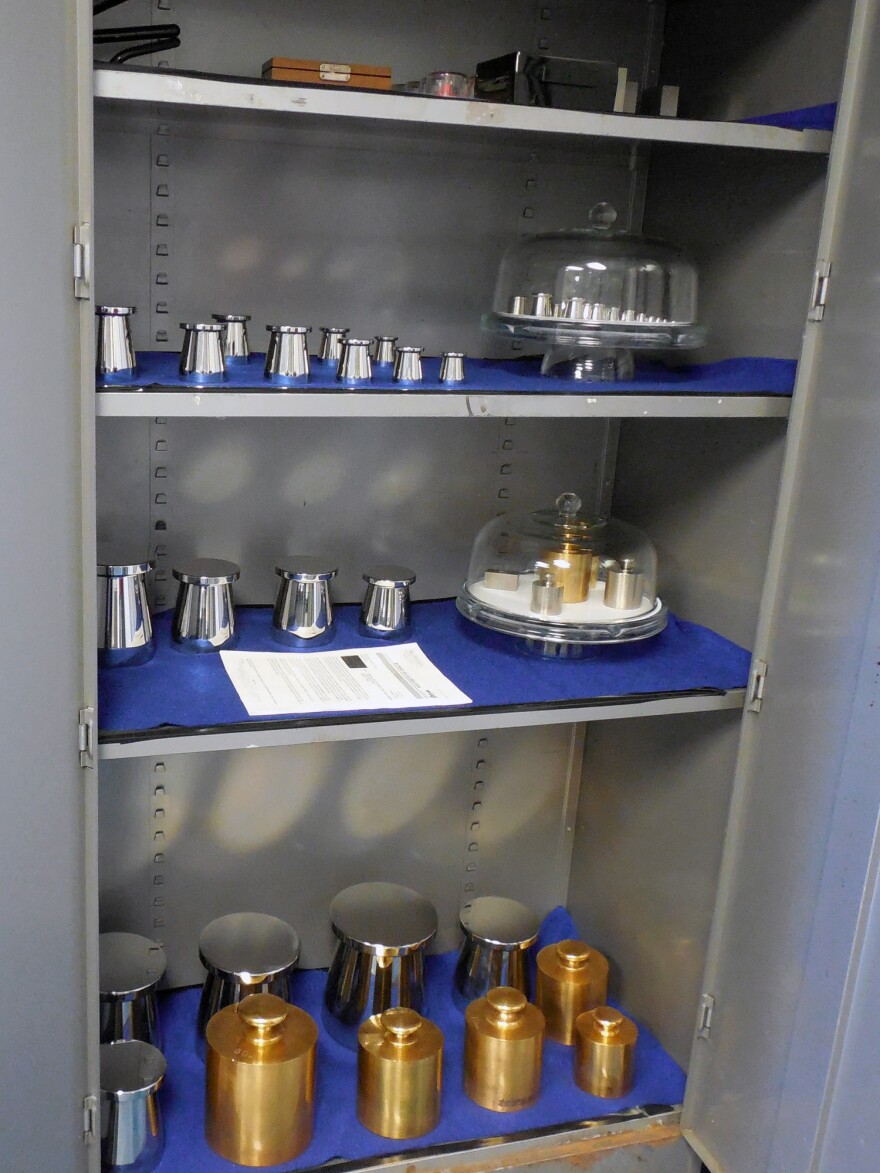From a pound of tomatoes to a tank of fuel oil, it’s the job of the Agency of Agriculture’s Weights and Measures Program to assure Vermonters get what they pay for.
That requires keeping tabs on the thousands of scales, meters and pumps and even the occasional glass of beer.
The accuracy of a scale in your local supermarket can be traced to a single weight kept under lock and key with an armed guard outside of Paris, France.
The international standard kilogram, created more than a century ago, serves as the reference used by governments, including the State of Vermont, to insure the accuracy of their weight measurements.
Locked in a metal cabinet in a non-descript building in Berlin is a collection of weights traceable back to the international standard.
“I would never touch these with our hands. These are the actual weight standards for the State of Vermont,” says state metrologist Marc Paquette as he opens the cabinet.
The gleaming stainless steel and brass weights are used to verify the accuracy of the weights used in the field by state inspectors and by companies that service scales.
"We have a one-millionth of a pound test weight here in the lab. You can hardly see it!" - Marc Paquette, state metrologist
“We have traceability on this," Paquette says as he removes a small wooden box from the cabinet. "This is a kit that has test weights from one-thousandth of a pound down to one-millionth of a pound. So we have a one-millionth of a pound test weight here in the lab. You can hardly see it!”
Paquette, who has worked in the program for 26 years, manages the state’s weights and measures laboratory, including spotless, climate-controlled rooms where weights are checked, and a garage area containing rugged squat cubes and cylinders used in the field.

Cast iron weights as heavy as 1,000 pounds are designed to test scales used to measure truckloads of asphalt, concrete, feed and minerals. Lighter weights are for testing scales in stores.
There’s a science involved that goes beyond simply plopping a weight on a supermarket scale.
For example, no test weight is exact, so there’s an allowable deviation. Then there are the variations caused by temperature and other factors. These are all part of what’s called the "uncertainty budget."
The other main function of the Weights and Measures Program is verifying liquid measurements. It involves annual unannounced checks on fuel and propane truck meters and the state’s 6,000 gas pumps.
Paquette says while some merchants aren’t happy to see him coming, many are glad for the inspection.
“The device owner wants to know that the device is not giving away and that it’s accurate and correct,” he says. “In many cases we have found oil trucks giving away a significant amount of product, or gas pumps giving away product. Our goal is to have equity in the marketplace: Fairness between both buyer and seller.”
Each inspection takes time. Pacquette is one of the program’s five full-time field inspectors. With the arrival of warmer weather, the group’s attention turns to gas pump inspections.
After checking the inside of a pump at a Montpelier gas station, Paquette fills a container with gasoline until the pump registers 5 gallons. The container has been calibrated to a laboratory standard. Five gallons of gasoline would come up to a level marked zero on the container.

“Zero would be a perfect calibration, and we are at plus-2 cubic inches on a 5-gallon draft,” Paquette explains as he works. “Tolerance is plus or minus six, so the pump is well within tolerance. It’s actually giving away just a little bit of fuel, but so little it’s insignificant, really.”
Because the pump dispenses more than one grade of gasoline and has nozzles on both sides, Paquette has to repeat the test several more times, filling his containers from the pumps and draining them into the gas station’s underground tanks.
Inspectors have seen pumps that deliver as much as a gallon under in a 5-gallon test, and those that dispense a gallon too much. Paquette says most errors are due to poor maintenance, not intentional fraud.
The Weights and Measures Program often responds to calls from consumers. Gas pumps are a frequent complaint, as are inaccurate cash register scanners at stores. On one occasion, it was the proverbial guy who walked into a bar.
The Weights and Measures Program often responds to calls from consumers. Gas pumps are a frequent complaint, as are inaccurate cash register scanners at stores.
On one occasion, Paquette heard from the proverbial guy who walked into a bar.
In this case, the guy ordered a pint of beer – 16 ounces – and noticed that another patron who ordered a smaller 12-ounce glass got just as much beer. It turned out the restaurant had ordered the wrong size glasses.
Paquette’s program works with businesses to correct problems, but it does issue fines.
Since January, first the program has issued more than $100,000 in penalties.





